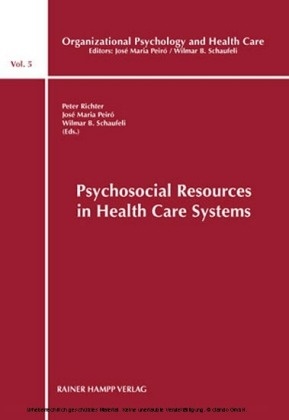Read more
Jobs and organizations are changing more and more rapidly. These changes go along with increasing demands, job insecurity, and feelings of stress and overload. Although all economic sectors are confronted with such drastic changes and negative consequences, this book shows that there are of a special nature in the human service industry. However, at the same time, many changes also pose challenges and produce resources that may cause learning, growth, and development. In addition to the more traditional view that focuses on the negative effects of organizational change, this book also emphasizes the potential positive aspects. Since 1985 the European Network of Organizational Psychologists (ENOP) has initiated a series of conferences in the field of health care. The IX conference took place in October 2005 in Dresden. Traditionally, job stress factors and mental health have been the main topics in earlier conferences but since the turn of the century a positive approach emerged that focused on resources instead of demands and on well-being instead of stress. Therefore, the Dresden conference focused on "Psychological Resources in Human Service Work". This volume includes 15 contributions from authors of 9 countries from Europe and Canada. The contributions are structured in three sections. The first section includes chapters about work conditions and organizational changes in human service work, especially in nurses and teachers. The second section deals with organizational and emotional stress factors, and well-being. The final section includes chapters about knowledge work in health care and competence training.
List of contents
1;Table of Contents;6
2;Preface;8
3;Part I Health Care for Special Processes;12
3.1;Interaction, Work-load, Health and Work Design in Nursing for the Elderly --- Jürgen Glaser, Bettina Lampert & Matthias Weigl;14
3.2;Structural and Procedural Factors in Outpatient Nursing Care Services related to Client Satisfaction --- Liselotte Boucsein, Wolfram Boucsein & Dieter Grunow;28
3.3;Nursing Turnover Intentions in Relation to the Contextual Factors, Team Climate and Organisational Commitment in Long-Term Care Units --- Laura Pekkarinen, Timo Sinervo, Marko Elovainio, Anja Noro & Harriet Finne-Soveri;40
3.4;Is there an Optimal Size for Health-Care Teams? Effects on Team Climate for Innovation and Performance --- Angel Barrasa, Michael A. West & Francisco Gil;52
3.5;Predictors of Work Ability in Teachers and Office Workers --- Reingard Seibt, Lars Luetzkendorf & Marleen Thinschmidt;68
3.6;Employee's Affective Commitment and Propensity to leave in Human Services. The Role of Perceived Organizational Support and Psychological Contract. --- Jose Maria. Peiró, Yolanda Estreder, Jose Ramos, Amparo Caballer & Francisco Gracia;82
4;Part II Stress and Organizational Factors;96
4.1;Towards Strategic Stress Management in the Workplace: Stress in Medical Doctors' Professions --- Anna B. Leonova;98
4.2;Job Demand - Control and Effort-Reward Models, and Burnout in Hospitals --- Peter Richter, Alexander Stoll & Holger Pfaff;112
4.3;Non-linear Associations between Job Features and Wellbeing? Cross-Sectional Data from the Whitehall II Study --- Leif W. Rydstedt & Jenny Head;126
4.4;Validation of the Dutch Questionnaire on Emotional Labor (D-QEL) in Nurses and Teachers --- Gérard Näring, Mariette Briët & André Brouwers;136
5;Part III Knowledge Work and Competence Training;148
5.1;A test of the Social Active Learning Hypothesis among Beginning Teachers --- Katrien Vermeulen, Peter Vlerick, Antonia Aelterman & Isabel Rots;150
5.2;The Management of Employees with common Mental Health problems: Occupational Physician or Psychologist? --- David S. Rebergen, David J. Bruinvels;162
5.3;Competence Development and Well-being of Hospital Nursing Personnel during Organizational Restructuring --- Kari Lindström & Matti Joensuu;172
5.4;Knowledge Utilization in Health Care: Roles, Facilitators, and Barriers --- Michael P. Leiter;182
5.5;Knowledge Work in Human Services - A Cross-Sectional Pilot Study --- Winfried Hacker & Peggy Looks;196
6;List of Contributors;216
About the author
Peter Richter ist Organisations- und Verwaltungssoziologe an der Wirtschafts- und Sozialwissenschaftlichen Fakultät der Universität Potsdam. Dort promovierte er 2008 mit vorliegender Arbeit.

